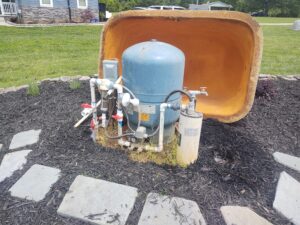Understanding the Key Components of Effective Water Purification Systems

Relevance of Water Filtration Equipment
Water purification systems play a vital function in ensuring access to secure and tidy drinking water by properly getting rid of impurities and pollutants. These systems are crucial in attending to the growing concerns over water quality and the potential health and wellness threats connected with eating infected water. By utilizing numerous purification devices such as reverse osmosis, activated carbon, and UV sanitation, water purification systems can successfully get rid of damaging substances like germs, infections, hefty metals, and chemicals from the water system.
Moreover, water filtering systems aid to enhance the preference and odor of water by removing chlorine, sediments, and various other contaminants that can influence its quality. Water Filtration Systems. This improvement in water high quality not only makes it more palatable but also motivates people to consume alcohol an appropriate amount of water daily, advertising much better hydration and overall health
Types of Purification Components

Physical filters are developed to physically stress out impurities from the water. These filters can be made of products like ceramic, carbon, or even sand, and they function by trapping fragments larger than the filter's pores as water travels through.
Chemical filters utilize different chemical processes to eliminate impurities from the water. Instances include turned on carbon filters, which adsorb contaminations, and reverse osmosis membrane layers, which use stress to different contaminants from the water.
Biological filters make use of living organisms like germs or algae to break down raw material and contaminants in the water. These filters are usually used in wastewater treatment plants or natural water filtration systems.
Understanding the different kinds of filtration components is vital for choosing one of the most ideal water purification system for particular filtration requirements.
Function of Debris Filters
Debris filters play a crucial function in water filtering systems by effectively capturing solid particles suspended in the water. These filters are normally the very first line of defense in a purification system, getting rid of larger fragments such as sand, silt, dirt, and rust prior to the water relocates via finer purification phases. By trapping these sediments, the filters prevent them from getting to downstream components, hence expanding the life-span and effectiveness of the entire system.
The feature of debris filters is vital in keeping water top quality and securing sensitive tools from damages triggered by debris. In addition, by getting rid of noticeable fragments, debris filters enhance the clearness and taste of the water. Consistently cleaning up or changing debris filters is important to guarantee ideal performance. Disregarding this maintenance can result in obstructing, lowered water flow, and compromised purification efficiency. Overall, debris filters are crucial components that contribute significantly view website to the effectiveness of water purification systems.
Duty of Turned On Carbon Filters
Playing a crucial function in water filtering systems, turned on carbon filters are crucial in removing impurities and pollutants from the water supply. As water passes via the filter, the activated carbon draws in and holds onto the contaminations, making certain that the water that comes out on the various other side is cleaner and more secure for consumption.
Turned on carbon filters are very effective at boosting the taste and smell of water by lowering chemicals that can impact its quality. Due to their versatility and integrity, activated carbon filters are a key element in ensuring that water is detoxified to the greatest standards prior to getting to consumers.
Comprehending Reverse Osmosis Systems
Reverse osmosis systems are advanced water filtering systems that utilize an advanced process to remove pollutants and contaminations from drinking water. These systems function by applying pressure to the water, compeling it via a semi-permeable membrane. This membrane layer serves as an obstacle, allowing just distilled water particles to travel through, while blocking bigger molecules such as minerals, chemicals, and other pollutants. Because of this, the water that appears beyond is substantially cleaner and much safer for usage.
One secret benefit of reverse osmosis systems is their capacity to get rid of a variety of impurities, including heavy metals, dissolved solids, microorganisms, and infections. This makes them highly reliable in improving the general high quality and safety of alcohol consumption water. In addition, reverse osmosis systems are relatively low-maintenance and can be installed under the sink or in a main filtration system, supplying practical accessibility to tidy water throughout the home. In general, understanding how reverse osmosis systems work can help people make informed decisions why not look here concerning their water filtration demands.
Verdict
In verdict, efficient water filtering systems are vital for making sure clean and safe drinking water. The vital elements of these systems consist of sediment filters, activated carbon filters, and turn around osmosis systems. By comprehending the function and function of each component, people can make educated decisions when picking a water filtration system. It is essential to focus on the quality of water in order to advertise overall wellness and well-being.
Water filtration systems play a critical function in ensuring access to tidy and safe drinking water by properly removing impurities and impurities. By using different purification mechanisms such as reverse osmosis, triggered carbon, and UV sanitation, water filtration systems can effectively remove hazardous compounds like microorganisms, viruses, heavy steels, and chemicals from the water supply.
Debris filters play an essential function in water purification systems by effectively recording solid bits put on hold in the water (Water Softeners).Playing a critical duty in water filtering systems, triggered carbon filters are instrumental in eliminating pollutants and pollutants from the water supply.Reverse Home Page osmosis systems are advanced water filtering systems that use an innovative process to remove impurities and impurities from alcohol consumption water